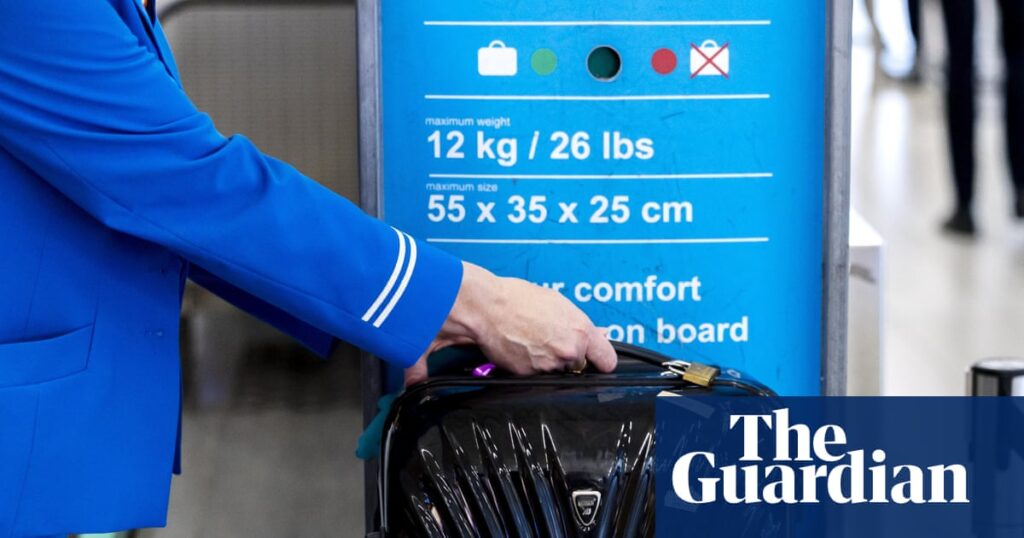Ryanair is considering increasing a bonus paid to staff for identifying passengers’ oversized luggage, its chief executive has said.
The Irish budget airline pays staff about €1.50 (£1.30) for intercepting customers who are bringing bags on to an aircraft.
The bonus is capped at about €80 for each staff member a month, the Sunday Times reported at the weekend, citing a payslip from a former employee which listed a “gate bag bonus”.
Passengers are charged a fee of up to €75 for bringing luggage that is larger than they paid for while booking their journey.
Ryanair boss Michael O’Leary said on Monday that more than 99.9% of passengers comply with baggage rules, with “sizers” located within the airport.
He said: “We are happy to incentivise our (staff) with a share of those excess baggage fees, which we think will decline over the coming year or two.
“It is about €1.50 per bag – and we’re thinking of increasing it, so we eliminate it.”
Ryanair includes a small carry-on bag – capped at a size of 40x20x25cm and weight of 10kg – with every ticket.
Passengers must pay a fee if they want to bring larger luggage, or if they want to bring multiple bags.
Earlier this month, it emerged that airport staff at Swissport, an aviation company that operates passenger gates at airports, could receive £1.20 for “every gate bag taken” as part of the “easyJet gate bag revenue incentive” scheme.
The European parliament is pushing for airlines to allow passengers to bring on free an onboard personal item and small hand luggage. However, Mr O’Leary predicted the proposal will not come into law due to a lack of space.
Speaking to the business news on RTÉ’s Morning Ireland, he said: “We’re flying largely full flights, about half the passengers can bring two bags and the other half can only bring one – because that’s all that fits in the plane.
“We’re already struggling with that amount of baggage. That’s one of the reasons we are so aggressive about eliminating the scourge of passengers with excess baggage.”
Separately, the budget airline, which faces potential disruption across the industry unless the EU and the US agree a trade deal before 1 August, said it is hopeful that commercial aircraft will be exempt from US tariffs under a civil aviation agreement from 1979.
Its chief financial officer, Neil Sorahan, said there was “an increase in confidence that the 1979 exemption would remain until the mention of 30% tariffs came up a week or so ago.
“But I think Europe were right in not retaliating immediately,” he said.
It comes as the EU and the US enter into another week of talks, with negotiators trying to reach a deal before 1 August, when Trump has threatened to hit most EU exports with 30% tariffs.
after newsletter promotion
Maroš Šefčovič, the EU trade commissioner, said last week that a tariff of 30% or more would have a huge impact, making it “almost impossible to continue” current transatlantic trade, which is worth €4.4bn a day.
Some airlines have warned they will not be able to absorb the cost of the tariffs. Last month, American carrier Delta Air Lines, which took delivery of 47 Airbus aircraft produced in Canada, Germany and France last year, warned it might have to stop buying foreign-made planes.
Ryanair is Boeing’s biggest customer in Europe, and therefore could be exposed to levies on commercial aircraft.
However, Sorahan added that any tariff costs would be primarily absorbed by Boeing, the American plane manufacturer.
“It is a Boeing issue, not a Ryanair issue,” he said. “We have a fixed price with Boeing on the aircrafts … we’ll absolutely work with Boeing to try to mitigate the costs if it comes to pass. But I hope sense prevails.”
Ryanair, which is headquartered in Swords, Dublin, also reported that its post-tax profit more than doubled to €820m (£710m) in the three months ended in June, partly thanks to a strong Easter holiday season.
The average fare rose by 21% compared with last year to €51. It follows a 7% drop last year, when cost of living pressures meant that consumers reined in their spending.
However, passenger growth is being hampered by delays to new aircraft deliveries, Sorahan said. The company expects a rise of “just 3%” to 206 million passengers in the full year.


